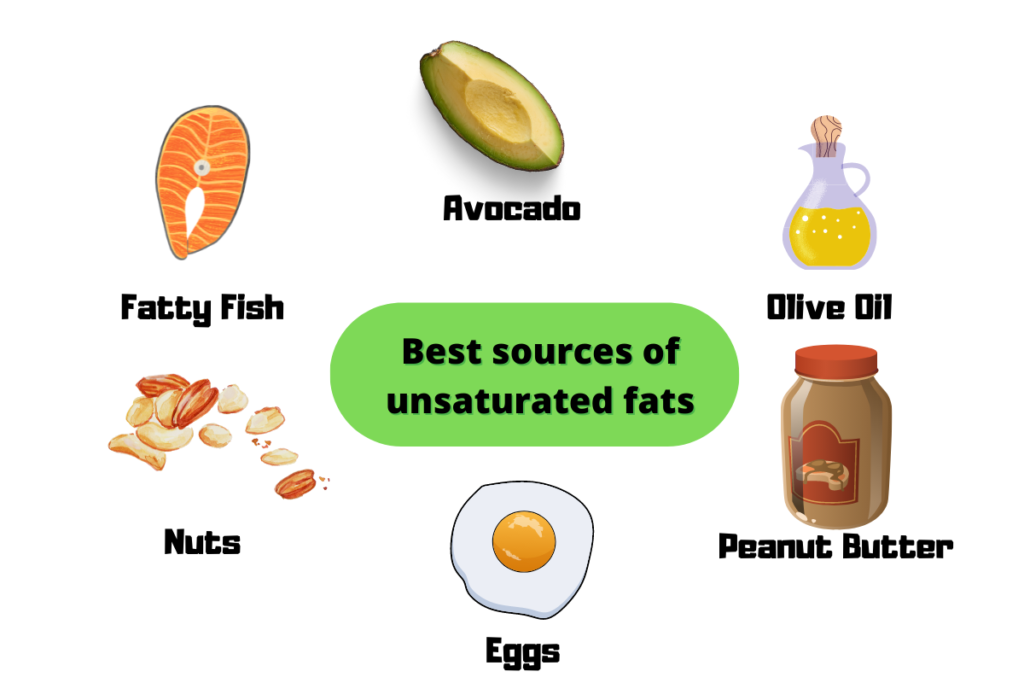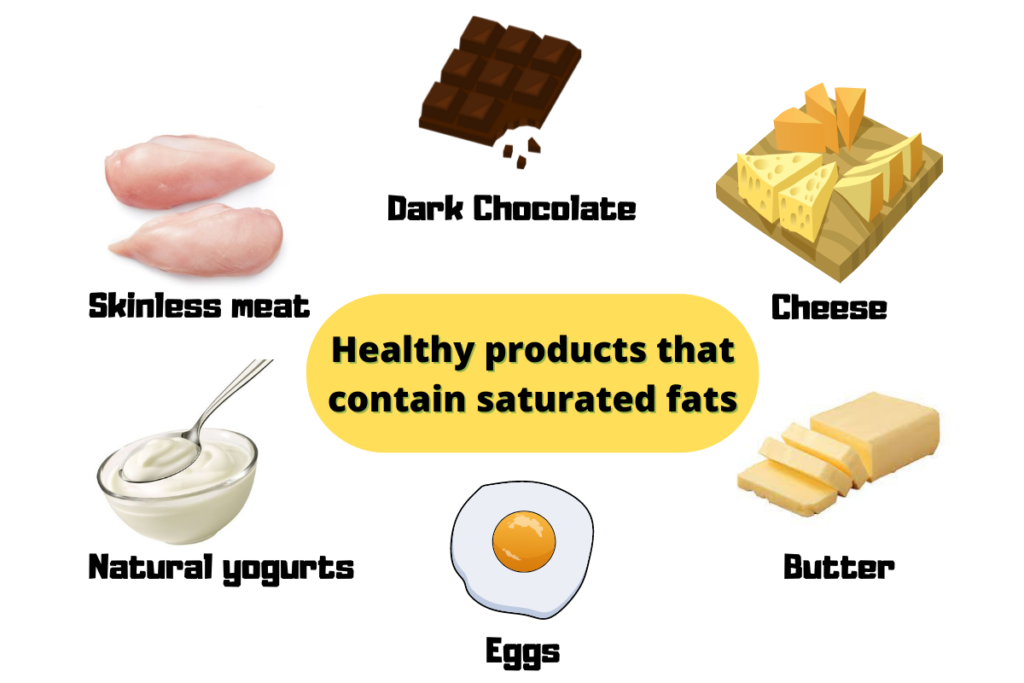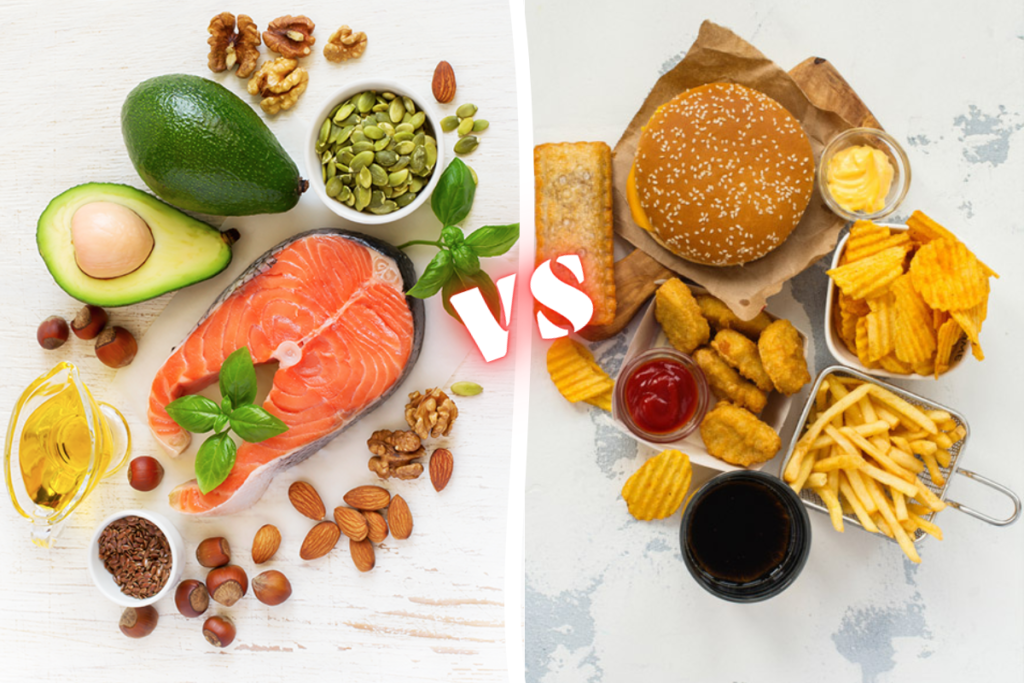It is assumed that 20 to 35% of our daily energy should come from fats. Besides, our brain is mostly made up of fat Therefore, an adequate fat intake is essential for proper functioning. Unfortunately, the modern fashion for weight loss often promotes fat hatred. However, as long as we can distinguish between its healthy and unhealthy sources, there is nothing wrong with fat. So, in this article I’m going to help you understand which fats to choose and which to avoid.
The functions of fat in the body
✅Provides energy
✅Protects the organs
✅Helps hormones to function properly
✅Supports cell growth
✅Keeps cholesterol and blood pressure under control
✅Helps the body to absorb vitamins A, D, E, K
Does eating fat make us fat?
Before we move to the more scientific aspects of fats, it’s worthy once and for all to debunk the myth. EATING FAT DOESN’T MAKE US FAT. It’s not the type of macronutrient, but their excessive consumption – the caloric surplus – that contributes to gaining weight. It’s enough to take into account the ketogenic diet – it is often used for weight loss, and around 70% of the daily energy on such a diet comes from fat.
On the other hand, we need to remember that fat is the most caloric out of the three macronutrients. 1g of fat is 9kcal, while 1g of protein/carbs is 4kcal. For this reason, we should be careful with the amount of fat consumed. But most of all, we need to be aware of which type of fat is beneficial and which one is harmful to our bodies.
Unsaturated fats
Moving to the division of fats, let’s start with the healthiest type. Unsaturated fats should be dominant in our diet. Their distinctive feature is the liquidity at room temperature. Regarding the structure, we can distinguish mono- and polyunsaturated fats.
Nevertheless, from the perspective of our health, we need to focus on two types of polyunsaturated fats: omega-3 and omega-6. These are called Essential Fatty Acids (EFA), and since our bodies cannot synthesize them, we need to deliver them from the diet. They both play a crucial role in the functioning of our cells, hormones and brain. The tricky thing is that omega-3 fatty acids work as an anti-inflammatory, but the excessive amount of some omega-6s is pro-inflammatory.
Therefore, to avoid unwanted side effects, we should keep a healthy ratio between omega-3 and omega-6 in the diet. It is generally advised to keep it between 1:1 to 1:4 (omega-3:omega-6).
Not without reason, the Mediterranean diet is considered one of the healthiest. People from that region consume a lot of seafood and olive oil, and thus provide their bodies with more omega-3 in comparison with other nations.
The animal source of omega-3 is the key here – according to research, DHA and EPA fatty acids that are found in fish help to mitigate the risk of cardiovascular diseases. Therefore, the protective effect of omega-3 can be reached by eating fatty fishes (WHO recommends eating at least 2 portions/week) and/or supplementing omega-3 rich in EPA and DHA1.

Saturated fats
This group of fats has been highly controversial in recent years. All due to the hypothesis that excessive consumption of saturated fats can cause cardiovascular diseases. Nevertheless, the newest studies show that there is no evidence to support such a statement2.
Unsaturated fats rise up the HDL cholesterol (so called ‘good cholesterol’) and saturated fats raise up the LDL cholesterol (so-called ‘bad cholesterol’).
According to the review on current literature, LDL cholesterol does not cause cardiovascular diseases3. There is more research needed to unambiguously establish what causes atherosclerosis and heart attacks, but scientists start to claim that sugar, insulin resistance, processed foods and thus chronic inflammation are the main reasons. And at the bottom of the iceberg, there is oxidative stress that causes the oxidation of the LDL cholesterol and makes it much more susceptible to creating blood clots.
Therefore, we don’t necessarily need to avoid cheese, butter or different types of meat. Instead, we should keep an eye on the amount of simple sugars and processed foods that we consume. Additionally, we should eat as many antioxidants as we can, to fight back the oxidative stress.

Trans fats
Trans fats which occur in some animal products are not considered harmful, but artificial trans fats, which are hydrogenated vegetable oils, have a serious impact on health. All the commercial snacks are packed with trans fats that eventually cause inflammation and increase the risk of mortality.
Epidemiological studies have shown that the consumption of trans fatty acids contributes to the development of cardiovascular diseases, neurodegenerative diseases, and metabolic syndrome4.
To be honest, from the moment I started to educate myself on nutrition, I haven’t come across a single positive opinion on trans fats. Therefore we should try to limit their consumption to the bare minimum.

Conclusions
As newborns we come to this world in the state of ketosis (using fat as the main energy source). The same state can be reached in a few days of fasting. It means that it’s natural for humans to use fat efficiently as an energy source. Our bodies will be happier and, what’s more important, healthier if we will be delivering them good quality fats.
To be clear, I don’t personally recommend trying a ketogenic diet, because, in my opinion, such big restrictions are unsustainable in the long run. Instead, let’s focus on avoiding simple sugars and trans fats, and exchange them for wholegrain carbs and healthy sources of unsaturated and saturated fats. Concluding, to enjoy food without harming your health, read labels carefully and choose the least processed products 🙂
References
- https://www.mayoclinicproceedings.org/article/S0025-6196(20)30985-X/fulltext
- https://www.ncbi.nlm.nih.gov/pmc/articles/PMC2824152/
- https://www.tandfonline.com/doi/full/10.1080/17512433.2018.1519391?fbclid=IwAR2MxLmU1_MZQ-DgbXsO7L5V418R59gRXUlXil2ea_ig-TKnXW5cw8OuRCk
- https://www.jstage.jst.go.jp/article/bpb/44/10/44_b21-00449/_html/-char/en
